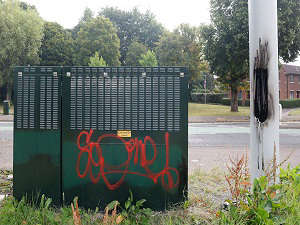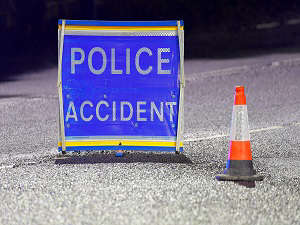
By David Young, PA
Goods arriving in Northern Ireland from Great Britain that fail to pass new Brexit checks will be sent back, Northern Ireland’s chief vet has warned.
Robert Huey said while he wanted to take a pragmatic approach to enforcement, he had to comply with new Irish Sea trading laws agreed as part of the Northern Ireland Protocol.
Mr Huey said another option would be the destruction of produce, but he predicted most traders would opt to have their goods shipped back.
“They can’t retrospectively provide me with certification or provide me with something else,” he said. “If it’s non-compliant, it goes back.”
The chief veterinary officer estimated that fewer than 50 roll-on/roll-off lorries a day would be subject to physical inspections at Belfast and Larne when the rules come into place in January.
He said he expected very low non-compliance with the rules.
Mr Huey visited the new facilities in Belfast on Tuesday as Stormont’s department of agriculture, environment and rural affairs published new guides for traders bringing goods into Northern Ireland from January.
He said short non-enforcement periods would be observed at the start of next month to allow businesses time to get used to new requirements.
The protocol, which is part of the Brexit Withdrawal Agreement, was designed to avoid the need for border checks on the island of Ireland when the UK leaves the EU.
It has achieved that by creating new customs and regulatory processes on trade between Northern Ireland and Great Britain.
From January, additional regulatory checks will be required on animal-based food products entering Northern Ireland from Great Britain and strict rules on the movement of live animals, including pets, will apply.
The UK and EU has agreed a three-month grace period for supermarkets and other retailers to adjust to the arrangements.
This will enable supermarkets to only have to fill out one all-encompassing export health certification for a lorry-load of goods, as long as they put a stamped seal on vehicle doors during transit.
After March 31, they will be required to secure a vet-approved certificate for each type of animal food product being shipped.
Mr Huey said that at the start of January there will be a week of non-enforcement over non-compliance with certification and seal requirements.
He added he would allow two weeks of non-enforcement of another protocol requirement – labelling stock for sale in Northern Ireland, adding: “They’re going to get a warning, a warning note to tell them what they haven’t complied with in the first week.”
“That’s all. I can see no reason why supermarkets shouldn’t be 100% compliant by the end of that first week in the issues I’ve asked them and then completely compliant at the end of the second. So I’m not expecting a level of non-compliance.”
Under the protocol, which comes into effect when the Brexit transition period ends on December 31, Northern Ireland will remain in the single market for goods and adhere to EU rules on food safety and animal health.
Mr Huey said it was difficult to accurately estimate how many vehicles would use the Irish Sea routes in January. He said some traders could wait to assess how the new arrangements were working.
“My estimation is that the numbers coming we will be able to handle because of the systems that we put in place, because of this pragmatic compliance framework that we put in place, and because of the facilities we have,” he said.
“I think we will be able to cope, but can I guarantee that we can cope? No, I can’t.
“But all I can guarantee is that there’s an awful lot of people working very hard to make sure that we can.”


 Spate of 5G mast attacks impacting hospital communications
Spate of 5G mast attacks impacting hospital communications
 Campaign launched to combat rise in online sex offences against children in NI
Campaign launched to combat rise in online sex offences against children in NI
 Arson attacks on Belfast 5G phone masts ‘extremely reckless’, say police
Arson attacks on Belfast 5G phone masts ‘extremely reckless’, say police
 Man dies in hospital after fall from electric scooter
Man dies in hospital after fall from electric scooter
 Slight rise in A* and A grades achieved in A-levels in Northern Ireland
Slight rise in A* and A grades achieved in A-levels in Northern Ireland